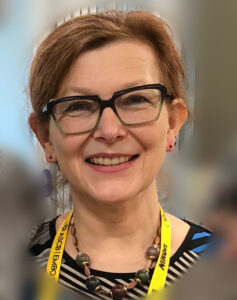CDB DEI Interview: Irina Kaverina, April 2021
Introduction
Welcome to the inaugural CDB DEI Interview featuring Dr. Irina Kaverina, Ph.D., Professor in Cell & Developmental Biology (CDB) and co-chair of the CDB DEI committee. This interview was conducted and written by Dr. Natalya Ortolano, Ph.D., recent CDB graduate. This is the first in a series of interviews that we hope will draw attention to the diversity in our community and department and in the experiences and backgrounds of everyone in it. If you are interested in contributing to a future interview, either as a writer or interviewee, please contact the CDB DEI committee.
CDB DEI Interview: Irina Kaverina, PhD.
 Can you briefly describe your “science journey?” Where did you do your training and how did you decide to pursue academia?
Can you briefly describe your “science journey?” Where did you do your training and how did you decide to pursue academia?
In short, for BS and MS (a single program in that education system) I graduated in 1989, majoring in virology, at Moscow State University. I did my PhD (graduated in 1992) at the Cancer Research Center of the Russian Medical Academy in the laboratory of Jury Vasiliev. Because the PhD program was so short, I stayed for three more years in the same lab as a postdoc. Then, I moved to Vic Small’s lab in Austria – first as a postdoc, then as a non-tenure-track faculty. From there, I was recruited to Vanderbilt as a tenure-track Assistant Professor.
I have studied the cytoskeleton of motile cells throughout my training. Both my advisors were visionary scientists and prominent microscopists, who taught me to appreciate the importance of structure-function relationships in a cell. The main turning moment in my career was in Vic Small’s lab, when I discovered and characterized the phenomenon of microtubule targeting of focal adhesions. Because of the novelty and significance of that finding, I knew that I could make a difference and I always would be pursing unanswered questions in cell physiology. Eventually, I decided to be an independent scientist and have my own lab. Now, after 15 years as a PI, my mission is to assist my trainees to make their own discoveries.
How have your experiences working in different countries during your training impacted how you mentor?
The styles of mentoring in two countries where I was trained have been very different. I am very grateful to my both brilliant mentors, who taught me all I know. As a PhD student, I worked completely independently on the bench, but I never realized that I am allowed to propose an experiment or an idea. When I moved to Austria, my mentor let me do anything I want. When I had an idea, I entered Vic’s office and said “Vic, what if we do this?”. Vic would jump up from his desk, his eyes would light up, and he was totally on board with all my crazy suggestions (well, most of them). Of course, I wasted a lot of time scattering around, but I did publish seven first-author papers in eight years. Because of that, in my lab I am attempting to follow Vic’s style, encouraging my trainees to own their projects and be proactive. I do believe that allowing trainees to explore their creativity is critical for the development of their scientist’s minds.
All my experiences during my travels have definitely impacted me as a mentor. Most of my journey in science was filled with appreciation of the beauty of the natural world, discoveries, achievements, friends. I am hoping that I can convey the joy of scientific enthusiasm to my lab. There were challenges, of course. I know what it is like to be a reserved female student in a male-dominated culture. I also know what it means to be an international trainee with poor language skills in a strange environment. I know that cultural differences may lead to an awful misunderstanding. I believe that I have learned to persist and prove myself by following my passion. I would like my trainees to be strong and passionate, but I don’t want them to be traumatized on their way. My laboratory is very diverse; I am aware of some challenges trainees are facing, and I also know that I am not aware of other challenges because they are different from my experiences. I am hoping that my trainees know that I am there for them: “my door is always open”.
What are your goals as a member and for the committee overall?
I am an idealist. My goal is that everyone is equal and everyone respects and loves each other. As I grew up in the Soviet Union, I was well aware of social injustice and lack of freedom in the society around me. My parents taught me to despise injustice. One of the personality-forming books of my youth was Emile Ajar’s “The life before us” – a book about how precious all human beings are.
I believe that academic science, of all places, should be, by definition, driven by scientific excellence only. It should be a safe place free of inequity. As members of CDB, we can start from striving to make our department such a place. To do that, we have to make sure that in the department everyone feels at home, and everyone has role models who look and identify like them. Of course, I still have to learn a lot about American history and inequities in modern American society. I want to educate myself and others to build empathy toward everyone else, so we understand each other’s feelings and motivations.
CDB DEI Interview with Dr. Irina Kaverina, Ph.D., April 2021.
Interview and text by Dr. Natalya Ortolano, Ph.D. with editing by Alex Pfannenstein.